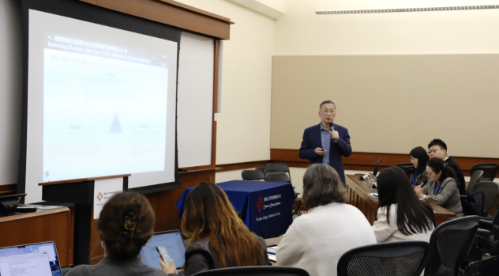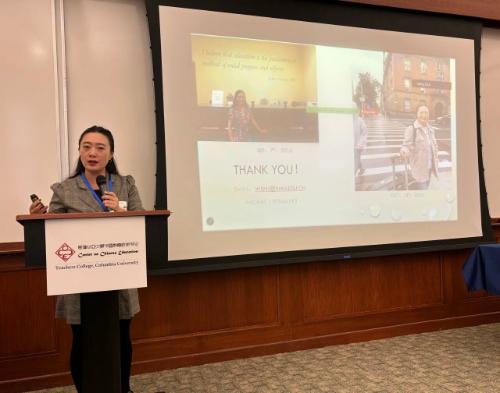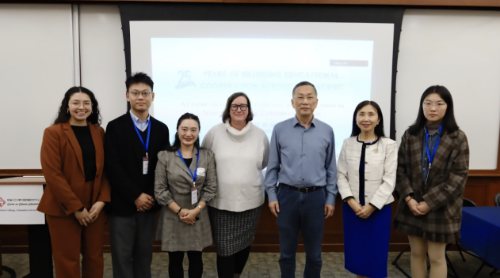Session 4 (Tuesday, October 14, 2025)
Symposium: Research on the Elemental Connection of Knowledge Systems between the U.S.A. and China
The afternoon symposium, “Research on the Elemental Connections of the Knowledge Systems between the U.S.A. and China,” was jointly organized by the Center on Chinese Education (CoCE) at Teachers College and the Institute of Higher Education Quality and Assessment at Xiamen University.
In the keynote speech session, Professor Qiuheng Shi, Distinguished Professor and Director, Institute of Higher Education Quality & Assessment at Xiamen University, and Professor Jing Wen from Xiamen University, together with doctoral researchers Yang Xu and Xinyan Sun, presented their ongoing research. Dr. Henan Cheng, Executive Director of CoCE, chaired the session. Dr. Roberta Lenger Kang, CPET Center Director presented and served as moderator, forming a diverse panel bridging academia, practice, and policy.
Professor Shi drew upon fifteen years of longitudinal research covering multiple countries, including China and the U.S., to analyze the interrelations among education, science, and talent. He also highlighted a policy shift in universities’ social engagement—from passive response to active participation—with service activities and partnership networks increasingly embedded in institutional strategies and performance evaluations.

Professor Qiuheng Shi (Xiamen University) delivered a keynote presentation
Prof. Wen’s report, “The Paradigm Transmission of Learning Quality in College Students: Theory Exploration and Empirical Evidence,” investigated how learning experiences shape students’ growth and the quality of talent development in higher education.

Professor Jing Wen (Xiamen University) presented recent research on higher education learning quality and student development
Doctoral researcher Yang Xu analyzed learning in engineering education through a four-variable framework, while Xinyan Sun challenged misconceptions of the “Chinese learning paradox,” showing that surface learning behaviors are context-driven rather than inherent.
During the final round-table discussion, participants explored forward-looking questions such as “What is the vision for Chinese universities by 2050?” and “What core competencies should K–12 education cultivate?” Professor Shi predicted that Chinese higher education would continue major reforms over the next 7–8 years, fostering students’ progress in lifelong learning and career planning. He voiced opposition to off-campus exam-oriented tutoring and emphasized that K–12 education should shift its focus from scores to holistic growth, thereby linking primary, secondary, and higher education more coherently. His remarks brought the day’s sessions to a thoughtful and forward-looking conclusion.

Guest speakers of the symposium